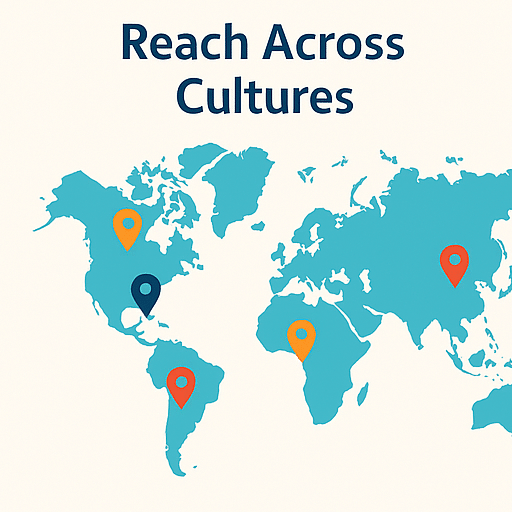我们的经济影响
每 $1 百万美元的投资可产生高达 $100 百万美元的长期影响
根据联合国开发计划署、麦肯锡(2021 年)、美国国际开发署和其他主要机构验证的收入提升基准。
从文化到社区振兴
当您支持手工艺集体的任何项目时,您所投入的时间或资金将为一个战略性、可持续发展和文化生态系统的规模化建设提供动力。 这不是一场运动--它是以遗产、社区、尊严和人工智能为基础的全球经济和创意赋权的永久性基础设施。
这个生态系统的基础是我们的动画系列片《星球夫人与教授》。-灵感来自 星球队长 并在原制作人芭芭拉-派尔的支持下发展起来的。星球夫人 让文化、遗产和工匠故事栩栩如生通过人工智能辅助的短篇节目,激发想象力、文化自豪感、参与性和商业性,覆盖数以亿计的观众。就像一代人以前的 "Planeteers "一样,我们的 遗产军团运动兴起-这是一支全球性的志愿者队伍,致力于弘扬和保护文化、提高工匠的地位并与世界分享遗产。
其核心是人工智能文化遗产 GPT,这是一个大型语言模型(LLM)。 根据 2003 年联合国教科文组织《保护非物质文化遗产公约》的原则,它可以捕捉文化、遗产、故事、仪式、方言、祖传知识、工匠技术和材料,否则这些都将失传。通过将这些过去和活的知识财富转化为人工智能数据领域,法律硕士项目 使人们能够了解自己的过去,也许还能了解未来通过相关的手工艺品,在精神上与它建立联系。 在线和零售店购物.
奇遇之旅 这是一次文化体验式旅行,提供了参观农村和城市工匠所在社区并与其接触的机会,促进了经济发展、文化交流和工匠之间的真实联系。
培训与赋权和大师与 学徒 手工艺集体 "发展生态系统的各个组成部分,包括 "展望未来 "和 "定制人工智能知识与发展框架",都是建立在为他们开辟的通往尊严、市场准入和适当、可持续生计的道路之上的。
我们的工作地点
我们的全球影响力横跨经济领域的两端。在全球南部,我们关注极端贫困地区的手工艺社区,包括非洲、南亚和拉丁美洲的部分地区。在全球北方,我们支持保护传统手工艺和代代相传的遗产,这不是一项扶贫举措,而是对文化身份的赞美。我们以讲故事为主导的外联活动帮助社区进行自我认同,创建了一个基层探索管道。

方法与外部验证
我们的收入提升基准借鉴了联合国开发计划署、麦肯锡(2021 年)、美国国际开发署等领先机构的研究成果,这些研究成果验证了文化、妇女主导和农村赋权计划的乘数效应。这些研究结果支持我们的预测,即通过 "手工艺集体 "的综合项目每投入 $1 百万美元,可产生高达 $100 百万美元的长期经济、社会和文化影响。
提升基准借鉴了以下方面的研究成果:
- 联合国开发计划署和 Acumen 基金:与自上而下的援助相比,以市场为基础的赋权模式(如工匠培训+进入平台)能产生更持久的收入,回报率通常在 5 倍到 10 倍之间。
- 麦肯锡(2021 年):如果将教育、创造就业和地方再投资等成果计算在内,包容性创业和中小企业扶持计划的投资回报率可达 6 至 14 倍。
- 美国国际开发署地方项目:发现 "需求驱动、社区自主的投资 "与传统的赠款周期相比,其长期复原力和价值要高出 7-10 倍。
| 贫困基准目标 | ||||
|---|---|---|---|---|
| 收入类别 | 基准来源 | 日收入阈值(美元) | 目标 | 国家示例 |
| 极端贫困 | 世界银行(2022 年,2017 年购买力平价) | $2.15 | 三倍收入(~$6.45/天) | 尼日尔、乍得、马达加斯加 |
| 中低收入贫困人口 | 世界银行 | $3.65 | 双倍收入(~$7.30/天) | 印度、尼日利亚、肯尼亚 |
| 中上收入贫困人口 | 世界银行 | $6.85 | 显著增加(50-100%) | 墨西哥、巴西、南非 |
| 全国生活工资基准 | GLWC / 安克研究所 | 因国家而异 | 与当地生活工资基准保持一致 | 孟加拉国(达卡)、危地马拉(城市)、菲律宾(马尼拉) |
Sustainability Standards & Guidelines
Artisanal Collective is committed to promoting sustainability and ethical practices across its operations to the greatest extent reasonably possible. We recognize the operational constraints faced by small producers, the limitations of global supply chains, and the variable capacity of our partner organizations. Accordingly, the following guidelines represent aspirational standards and best practices that we will strive to support and promote in partnership with our stakeholders, within the practical limits of our resources and mission.
- Responsible Sourcing & Environmental Impact
Artisanal Collective encourages the use of environmentally responsible practices, such as:
- Prioritizing renewable, recycled, and low-impact materials when available and affordable.
- Avoiding single-use plastics and unsustainable packaging where viable.
- Reducing energy consumption and supporting low-carbon production processes when feasible.
We understand that full carbon neutrality or circular sourcing may not be attainable for of our stakeholders. Our role is to promote progress toward sustainability, not to penalize producers for limited capacity.
- Ethical Production
While Artisanal Collective does not directly control day-to-day production, we seek to work with partners and producers who are aligned with our values. We encourage:
- Fair treatment of all workers, including safe working conditions, nondiscrimination, and the absence of forced or child labor.
- Artisan empowerment, including inclusive participation, income transparency, and benefit sharing.
Where evidence of unethical conduct arises, we reserve the right to discontinue representation or promotion of the affected producers or products.
- Biosecurity & Export Compliance
Artisanal Collective will make commercially reasonable efforts to support compliance with destination-country import regulations. This includes:
- Recommending treatment or certification for at-risk natural materials (e.g., raw wood, seeds).
- Providing country-specific guidance for shipping and packaging.
- Consulting with third-party experts where warranted.
We do not warrant or guarantee that all products will meet every country’s import rules. Buyers and producers are jointly responsible for confirming final requirements.
- Education & Support
Where resources allow, Artisanal Collective will partner with nonprofits, NGOs, and academic institutions to offer:
- Training on ethical production, sustainability, and cross-border commerce.
- Access to tools, templates, and certification resources.
- Guidance on material selection and packaging practices.
Our focus is on capacity-building, not compliance enforcement. Participation in training is encouraged but not mandatory.
- Monitoring & Reporting
We do not currently operate a formal ESG audit or enforcement program, but have planned to have one in place by the end of 2026. In the meantime:
- Feedback mechanisms and digital/AI reporting may be used in to support voluntary tracking.
- We reserve the right to request supporting information or remove products from promotional platforms based on concerns raised.
Enforcement mechanisms, if any, will be proportional, education-driven, and consistent with local realities.
- Collaboration & Evolving Practices
Artisanal Collective intends to evolve its sustainability practices over time. In the future, we may:
- Explore partnerships with verification or logistics entities.
- Pilot certification or labeling programs (non-mandatory).
- Issue additional guidance based on regional priorities or buyer feedback.
All changes introduced are phased in a non-punitive manner.
